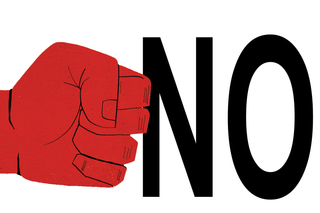
Women Question Their Safety Whenever They Reject Unwanted Advances
Women share stories of facing consequences for saying no.

Devanshi Srivastava was 19 when she was asked by the manager of a company she aspired to work for to come to his hotel room. “‘If you want something, you have to give something,’ he said,” she recalled. That’s the first time she realized what corporate sacrifice meant: it meant sacrificing herself.
Losing out on jobs, being publicly shamed for being provocative, or even bearing the brunt of physical assault are common consequences for women rejecting men’s advances, as apparent most recently in the sexual harassment case against the Chief Justice of India Ranjan Gogoi. The woman who rejected his advances and reported him for inappropriate touching has since lost her job, has been harassed and followed by strange men, she told Scroll.in. In a Twitter thread started by The Good Place actress and body positivity activist Jameela Jamil, she detailed how she was once punched in the face for rejecting a man. It spurred hundreds of women’s accounts of consequences they had to bear for rejecting a man, anecdotes that reflect the painful, and often an impossible-seeming reality for women — it’s not easy to say no when crores of accounts prove the no comes with emotionally, socially and physically debilitating consequences.
Nine years later, Srivastava found herself in a similar situation, when the managing director of the company she worked for started asking her to come for late-night rides and out-of-town trips, the now 27-year-old said. The constant harassment finally culminated in a phone call, during which he seemed to be masturbating on the other end; Srivastava quickly disconnected. After the apparent rejection, her boss started to show signs of anger and made her workplace uncomfortable, she said.
Related on The Swaddle:
Female Students Protest Sexist Hostel Rules
“I was determined because I had to run my house; I’m the eldest in my family,” Srivastava said. “I had my responsibilities and I was not in the wrong. I thought, ‘to hell with your attitude — I’m going to do my job and get my pay.’” When the leadership of the company changed and a woman was instilled in her boss’ position, Srivastava decided to open up about her experience. What she was met with, however, was comments from her new boss on the provocativeness of Srivastava’s WhatsApp profile photo and a suggestion she get married to decrease harassing experiences, Srivastava said. Eventually, she was let go from the company and wasn’t paid her due severance, she added.
“First of all you harass me. Then you destroy my career. Then they kept me hanging. And then they said you’re done. Then they’re not giving me my money, what I have earned,” Srivastava said. “I did all my work with full heart, and this is what I get in return.”
The root cause is entitlement, says Subhasree Das, 25, whose career was also threatened by a man she had rejected. Men don’t know what’s wrong, or how to talk to women, which results in toxic experiences, she said. Das had started talking to a potential romantic partner via LinkedIn, and had occasionally flirted with him over text, she said. When he proposed marriage, however, she politely declined him. He started calling 30 to 40 times a day, often from different numbers, and threatened to call her office, she said. She immediately blocked him from all social media, and removed her work information from Facebook. When she told the man she would go to the police if he didn’t stop the harassment, she recalled that he said, “Badnami tumhari hogi” (You’ll be the one slandered).
“It was an epiphany for me. I was like: you know what? This is, in fact, the reason why you guys harass women. Because you feel like you can do anything; you can shame people, and they won’t do anything in return,” she said. “I used to feel that this is how women are guilt-tripped into being with toxic men. I used to feel an obligation or pressure to give in to entitlement. But I know I won’t flirt again, because ultimately, people are going to blame me.”
There’s no way to gauge who will turn out to be a harasser, Das said. He seemed well-behaved, respectful and hardworking, but these parameters don’t mean anything when he underwent rejection, she said, adding that she exercises caution in all encounters with men now.
For Kunjika Pathak, 19, it’s more a matter of gauging the probability of incurring physical harm. She recalled hurling abuses at men who followed her around and tried to touch her when she was in the 7th grade cycling to and from basketball practice. It was around the time she started to become conscious of the space she occupies as a woman, she said. When men started constantly commenting on her body, however, she realized her coming of age was “extremely objectifying; extremely terrifying.”
Related on The Swaddle:
The Men Helping Other Men Challenge Toxic Masculinity
She has also gotten more cautious with her response to harassment. “I kept thinking about what if it came down to violence; eventually they are stronger than I am,” Pathak said. “I feel like when I was young, it was much more cut to the chase, like, yeah, I’m going to hurl abuses. And as I grow older, I realize I can’t be doing that. If push comes to shove, I’m the one who will be in trouble.”
“In person, it’s very hard to resist advances without thinking about what’s going to happen to me. I’m not physically trained to keep them off of me,” she added.
Often, its not even just the man that women need to be wary of, but an angry, righteous mob that will lend its solidarity to the harassing party. For example, a case that rocked Bangladesh in April involved a young woman, Nusrat Jahan Rafi, who filed a sexual harassment complaint against her headmaster, BBC reported. After the headmaster was arrested, mobs took to the streets to demand his release, ultimately setting fire to Rafi on the roof of her school.
Women have been sharing these stories for a long time now. You would have to be living under a rock to not know the sheer frequency with which such retribution is meted out to women who deign to assert themselves. But the danger this poses has led to a culture of hypervigilance, where women understand the gravity of rejecting a man, and are alert (often to a physically debilitating level) to the plight of other women in their surroundings. Unfortunately, the conversation about finding a solution to this problem circles around making women strong enough to handle or fight back against such abuse, and doesn’t focus on ways to stop the abuse itself. Teaching young girls self-defense or establishing women-only spaces puts the onus on women to ensure their own safety in compromising situations, without making men realize their toxic masculinity, male privilege, and responsibility to evaluate the effects of their behavior.
It’s time we stop asking women to say ‘no’ more loudly, more clearly — and start asking men to listen better.
Rajvi Desai is The Swaddle's Culture Editor. After graduating from NYU as a Journalism and Politics major, she covered breaking news and politics in New York City, and dabbled in design and entertainment journalism. Back in the homeland, she's interested in tackling beauty, sports, politics and human rights in her gender-focused writing, while also co-managing The Swaddle Team's podcast, Respectfully Disagree.
Related


The Buzz Cut: People Are Faking Diseases to Scam Sympathizers Online
